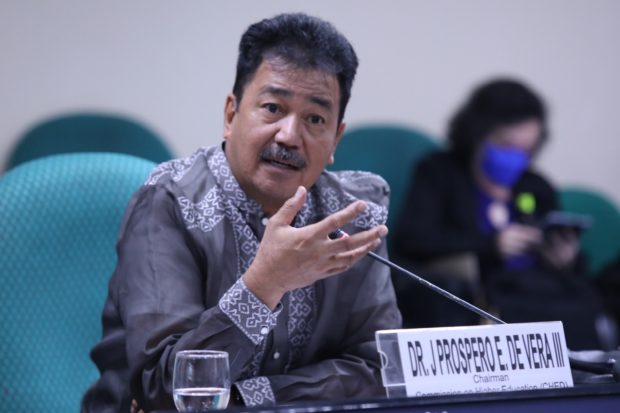CHED, DOH ready plans for ‘underboard nurses’

Chairman Prospero De Vera of the Commission on Higher Education (CHED). Senate PRIB file photo / Albert Calvelo
The Commission on Higher Education (CHEd) will ask universities for help in conducting “quality review” classes for nursing graduates who have yet to pass the board examination.
At the Laging Handa public briefing on Thursday, CHEd Chair Prospero de Vera III said that helping new graduates get certified was one of the “immediate actions” aimed at addressing the nursing staff shortage under the joint administrative order issued by the agency and the Department of Health (DOH) on July 19.
Also included in the order was the hiring of “underboard” nurses as clinical care associates (CCAs) while they attend review classes.
De Vera said that universities like Our Lady of Fatima, University of Santo Tomas and University of the Philippines-Manila had offered help in designing a good review program. The classes would be held near hospitals where the CCAs and underboard nurses work for their convenience, he added.
Lack of preparation
According to De Vera, historically, only 50 percent of nursing board takers pass the test.
Article continues after this advertisementHe said that among the reasons cited by those who failed were lack of preparation and failure to take review classes due to lack of money. For those who did take review classes, they claimed their reviewers were not good enough, he added. “We need to find the other 50 percent because they already have undergone hospital training, they have already studied nursing and they only had problems in passing the licensure test. So why [don’t] we help and guide them so that they can pass [the exam] so that immediately, we can add nurses in our hospitals?” De Vera said.
Article continues after this advertisementRedesigning master’s program
Another “immediate action” to be taken by the CHEd in the coming weeks would be the redesigning of the nursing master’s degree—a requirement for those teaching in nursing schools. De Vera noted that nursing schools could not expand their enrollment because even teachers were being recruited abroad.
Under the “hybrid” master’s degree program, the course will be shortened by crediting the students’ prior work experience as nurse or medical worker. The students will also be eligible for tuition and miscellaneous fees subsidies from the government in exchange for teaching in the country for a set period.
RELATED STORY:
Senators reject DOH chief’s plan to hire nursing board flunkers